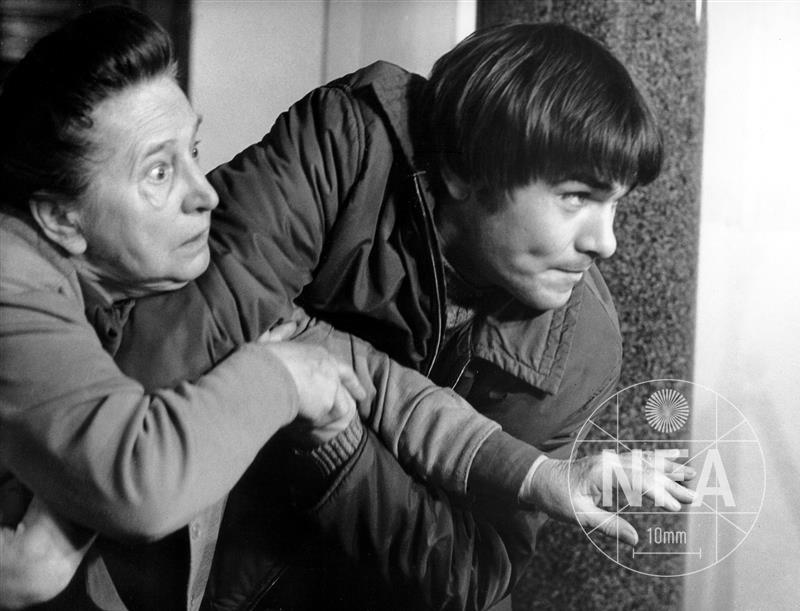Fate Named Kamila
Country
CzechoslovakiaCopyright
1974Production year
1974Premiere
21 June 1974Runtime
96 minDirector
Petr SchulhoffCategory
filmGenre
crimeTypology
featuretheatrical distributionlongOriginal title
Osud jménem KamilaCzech title
Osud jménem KamilaEnglish title
Fate Named KamilaSummary
In 1974, director Petr Schulhoff added to his already considerable list of crime films with Osud jménem Kamila (Fate Named Kamila). This drama, inspired by real-life events, tells the story of the theft of precious stamps from a postal museum. Things spiral out of control for the crooks involved. Taxi driver Tomáš Gross and his younger brother, bricklayer Pavel, also involve their youngest sibling, 16-year-old Ondra, in the heist. But thanks to the inexperience of the perpetrators, Tomáš’s plan to emigrate to Switzerland in order to be with lovely waitress Kamila begins to seriously unravel. Jiří Klem, Jaroslav Drbohlav and Vladimír Dlouhý play the three Gross brothers. The aforementioned Kamila remains unseen; she is merely a representation of Tomáš’s longing for freedom in Switzerland. However, Tomáš’s lover Eva is portrayed by Renáta Doleželová.
Synopsis
It is 1970 and taxi-driver Tomáš Gross is planning to leave for Switzerland to join his great love Kamila, previously a waitress in a Prague bar. With the help of his younger brother, bricklayer Pavel, Tomáš has already been stealing statuettes from churches and selling them to the antique-dealer Pánek, who has given him a letter from Kamila inviting him to join her, but on one condition: he must steal a rare stamp called the Vltava Carmine at a philatelic exhibition as a fee for the Swiss tourist Richter who will smuggle him over the border. Tomáš also brings his youngest brother, the sixteen-year-old Ondra, to Prague. He puts him up with Pavel in his bedsit, finding a false excuse to eject the girl Eva with whom he has been living since Kamila's emigration. Pressurized by their brother, Pavel and Ondra steal the stamp, but in their fear they use violence against the old woman attendant at the exhibition. The two boys, appalled that they may have become murderers, realize Tomáš's true nature, for he has taken the stamp and vanished. At the agreed place, Richter locks Tomáš into the trunk of the rented car, but just drives him to the woods and leaves him there. Richter then gets across the border in his own car. Pavel and Ondra learn from the newspapers with relief that the woman was only injured, and give themselves up to the police. Security men then free the nearly suffocating Tomáš from the car trunk. They tell him that the stolen stamp was just a copy for the display case and that the "tourist" Richter is in reality Kamila's husband.
Film online
Cast
Jiří Klem
taxikář Tomáš Gross
Renáta Doleželová
Voice by Stanislava Bartošová
Eva, Tomášova milá
Marie Drahokoupilová
barmanka Ilona
Zdeněk Ornest
vedoucí starožitnictví Karel Pánek
Jaroslav Drbohlav
zedník Pavel, Tomášův bratr
Vladimír Dlouhý
Ondra, Tomášův nejmladší bratr
Jürgen Frohriep
švýcarský turista Richter
Jan Pohan
kapitán VB Bartoš
Nina Popelíková
matka Marie Grossová
Jan Víšek
recepční
Arnoštka Červená
Voice by Marie Motlová
hlídačka v poštovním muzeu Kučerov
Karel Vavřík
hlídač v muzeu
Mirko Musil
vedoucí autoopravny Čejka
Alena Hessová
prodavačka ve starožitnictví Lída
Jiřina Bílá
šatnářka
Jan Kraus
výrostek
Stanislav Hájek
zákazník
Miloslav Homola
zákazník
Vincenc Vávra
host v baru
Ladislav Knížátko
host v baru
Dana Klossová
blondýna v baru
Věra Liptáková
dívka u baru
Ivan Martan
švihák
Josefa Pechlátová
babka v kostele
Jaroslava Panenková
žena před Poštovním muzeem
Vladimír Navrátil
host v baru
Miloslav Šindler
host v baru
Eva Ziková
dívka u stolu
Karel Karas
Angličan
Slávka Hamouzová
starší žena
Anna Bartošová
servírka
Daniela Šauerová
servírka
Marie Černá (2)
plavovláska
Vladimír Štros
manžel ve starožitnictví
Anna Štrosová
manželka ve starožitnictví
Stanislav Litera
příslušník Pohraniční stráže
Bert Schneider
příslušník VB
Zdeněk Skalický
číšník v baru
Miroslav Čermák
číšník
Beyene Afework
cizinec
Vít Clar
hudebník
Jaromír Klempíř
hudebník
Jan Pospíšil
hudebník
Miloš Vychytil
hudebník
Crew and creators
Director
Second Unit Director
Assistant Director
Continuity
Screenstory
Screenplay
Shooting Script
Dramaturg
Director of Photography
Second Unit Photography
Camera Operator
Production Designer
Assistent Production Designer
Set Designer
Miroslav Buberle, Bedřich Čermák, Jaromír Bieber
Costume Designer
Costumes
Make-Up Artist
Karel Marek, Alena Šedová, J. Křížek
Film Editor
Assistant Film Editor
Sound Designer
Production Manager
Unit Production Manager
Věra Winkelhöferová, Vlasta Mathauserová
Unit Production Manager
Daniela Norová
Consultant
Karel Kalivoda, Rudolf Fischer
Cooperation
Olga Hrčková (klapka), Josef Vítek (fotograf)
Music
Music Composed by
Music Performed by
FISYO (Music Conducted by Štěpán Koníček)
Songs
Tichá noc /Stille Nacht, heilige Nacht/
Song Composer Franz Xaver Gruber
Production info
Original Title
Osud jménem Kamila
Czech Title
Osud jménem Kamila
English Title
Fate Named Kamila
Category
film
Typology
featuretheatrical distribution
Genre
crime
Origin country
Czechoslovakia
Copyright
1974
Production Year
1974
Production specifications
projection approval 12 March 1974
withdrawal from distribution 31 December 1989
Premiere
premiere 20 June 1974 /inaccessible for youths/ (kino Letka, Praha)
premiere 21 June 1974 /inaccessible for youths/ (celostátní)
Production
Copyright Holders
Studio
Distribution
Creative Group
Dramaturgická skupina Miloše Macourka, Miloš Macourek (vedoucí dramaturgické skupiny)
Technical info
Duration typology
feature film
Duration in minutes
96 min
Original length in metres
2 682 meters
Distribution carrier
16mm, 35mm
Aspect ratio
1:1,66
Colour
black & white
Sound
sound
Sound system/format
mono
Versions
Czech
Dialogue languages
Czech, German
Subtitles languages
without subtitles
Opening/End credits languages
Czech
Awards
Vítěz
Event: Prémie Českého literárního fondu za rok 1974
1975
Praha / Czechoslovakia
Petr Schulhoff




